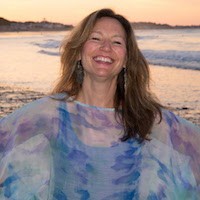As an eleven-year old, Julie Lovely joined the “I Love Horses” club and volunteered to clean stalls at therapy riding barns in exchange for time with the animals.
Horses helped her “escape the normal pains of growing up,” she said.
As a teenager, she witnessed hyper children become calm once on a saddle and a severely injured woman recovering from a traumatic brain injury (TBI) transform into a confident and carefree rider on her horse.
“I still get chills,” she said, remembering the boy with autism who said, “Walk on,” his first words, to a horse. He had been believed to be non-verbal. Lovely remembers him and his mother, too, who cried tears of joy.
She knows horses have the power to heal people and was a lifelong “horse person.” However, as a child, Lovely no idea how crucial horses would be to her own recovery, life and work.
Entering college, she assumed horses would be a “side thing” she’d squeeze into her free-time and pursued a graphic arts education.
Her plans and life changed by a fire which occurred weeks before her graduation from The College of St. Rose in 1999.
The last thing Lovely remembers before it started is being in her room, listening to music and working on her computer. She went away to visit her boyfriend and returned to “bed springs and piles of melted unidentifiable objects. And that horrid, horrid smell.”
She lost her final project, computer, art portfolio, clothing, furniture and all of her sentimental belongings. “There was literally nothing left,” she said.
Lovely’s roommate and friend was not injured in the fire, Lovely said, but questions about cause and location (Lovely’s room) ended the friendship.
“I felt so violated,” said Lovely, “It was like someone had come in and stolen everything.”
Though shocked, Lovely assumed she would “start a new life” when she moved to Boston to be with her fiancé, plan their wedding and look for a job.
“But that’s not what happened,” she said. Less than a year after the fire, her mother got seriously ill. Then, her father suffered a traumatic brain injury during an auto accident when his minivan was flipped over and into a ditch and landed roof-side down.
Lovely, an only child was beyond rattled. She felt angry, anxious and afraid another tragedy would happen.
She no longer enjoyed making art or working on her computer. “It was almost like I didn’t know who I was after this,” she said, “as though I was watching myself go through the motions of life.”
“I had no idea what was wrong with me,” Lovely said, though she now recognizes her symptoms as class post-traumatic stress disorder (PTSD).
“I couldn’t open my eyes wide enough,” she said. “The light didn’t seem bright enough; the colors didn’t seem vivid enough.” She said it seemed as though the world were covered by a veil of grey.
Her mother urged her to get professional help, which she did. Lovely was diagnosed with PTSD caused by the fire and exacerbated by her father’s car accident. Therapy, medication and family support helped, “to a point,” she said but the world remained grey.
The only time color returned for Lovely was when she was with horses.
“Horses are the only time I don’t think about anything else,” she said. She still loves the smell of the barn, the wood and hay and time tending to or working with horses.
Lovely founded Wild Hearts Therapeutic Equestrian Program in West Bridgewater, MA, in 2009 and serves as Executive Director. In May, she launched Horses for Heroes at her barn, a 10-week program for veterans, who gather to work with equines, Izzy and Morab, under the guidance of horse handler, Jen Goddard, and therapist, Nicole Long.
It is “is less about talking about feelings” and more about teaching horsemanship skills, Lovely said. Lovely collaborated with Goddard and Long for over a year before rolling out the program.
“Horses are super sensitive,” said Goddard. She teaches veterans how horses naturally communicate in the wild. Horses “can smell water five miles away, feel a fly land on them, and sense a change in your heartbeat,” Goddard said. Because horses are so responsive to the mood, body language and tone of voice of humans, they “keep you in the present moment.”
“Horses will react to what you’re feeling inside not just what you’re saying so that’s big,” said Lovely, of equine-facilitated psychotherapy (EFP).
Long believes the experiential aspect of EFP makes it effective and efficient. “Where talk therapy ends, this begins,” said Long.
In talk therapy, she explained, a client might talk about having anxiety attacks during their session but is rarely having one. In contrast, at the barn, emotions that arise while working with a horse are addressed on the spot. Long teaches breathing techniques to facilitate calmness, which helps her client and makes the horse more responsive, creating “an instant feedback loop
“I love it. It helps me relax” said Judy Freightner who is a twenty year Army veteran with post-traumatic stress and one of the first veterans to participate in the Horses to Heroes. She built trust with Izzy and Kipper, by brushing them first, indoors, and then doing obstacle course exercise in the pen.
Goddard “translates” the horse perspective so Freightner can understand how or why it responds the way it does.
“If a person is too passive or aggressive with a horse, the horse will walk away or stay still,” said Lovely, so unless a person changes their approach they “won’t get a different result.”
Unlike a person, though, a horse, “isn’t judging you,” said Freightner who has learned “a horse can’t pushed.” She has developed patience in the pen and become more patient in the pen. “What I have learned I try to put it in my daily routine such as having more patience with people,” she said.
About EFP, Lovely said, “We know it works.”
Plus, as her father recovered from his traumatic brain injury, she realized the acquisition of horsemanship skills could help veterans because it requires learning. Learning use both sides of the brain—an essential component of cognitive rehabilitation. Since a barn in “in the world” environment, Lovely thought it would be a great place to acquire new skills.
Lovely’s passion is what fuels her. She works more than full-time hours and takes no salary. She benefits by being with horses and enjoys her short commute—just footsteps from her front door. Lovely can often be found in her barn, horse hair swirling around her boots while brushing out her miniature horses, Jimmy and Bootsie, as well as the Izzy (Lovely’s own horse) and Kipper, (a Paint donated to the farm).
Lovely keeps the Horses for Heroes free to veterans knowing not everyone has a barn or access to a horse. To keep the program, which costs $5000.00 per person, free of charge to veterans, Lovely does non-stop fundraising.
Lovely relies on her personal experiences and insights as well as the entrepreneurial degree she received from Babson College in 2007 when making daily decisions about Wild Hearts.
She understands the shame trauma survivors feel and how long and difficult recovery can be, how medication and talk therapy, though helpful, can be incomplete.
Time with horses is essential to Lovely’s life and most effective at bringing color back to a world that symptoms of trauma can make gray.
Lovely used to believe, “If I was stronger, I wouldn’t be like this,” but no longer sees herself as damaged. In fact, she said, “I feel like the people I’ve met who have PTSD as a result of whatever trauma they experienced…. They tend to be the most sensitive, smart people I’ve ever met.”
It’s not like I’m cured of this thing,” she said, but she has great appreciation for her work and life. The normally reserved Lovely is willing to talk about her father’s accident and recovery as well as her own diagnosis, to say “me too” to those with lives impacted by trauma.
She used to hate spring because it triggered memories of the fire. “The color of the sky, the smell of the air. I’d start to feel detached, angry, not feel myself,” she said. She would keep her windows closed, she said, to try to shut out the season. Not anymore.
Today, she opens her windows, door and heart. Her mission is to help others saddle up to hope and “walk on” with horses, as she does.
Love elephant and want to go steady?
Sign up for our (curated) daily and weekly newsletters!
Editor: Renée Picard
Image: Mike Baird at Flickr










Read 1 comment and reply